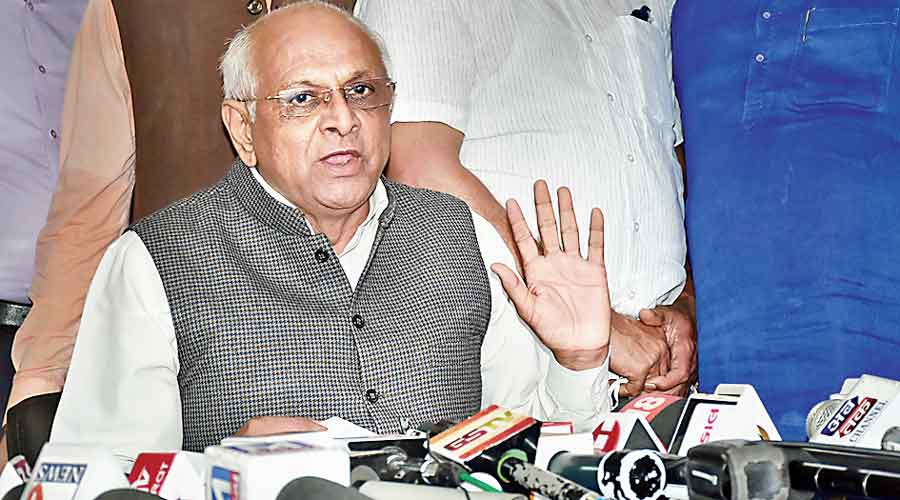The BJP on Thursday went for an overhaul in Gujarat by dropping all the ministers in the previous Vijay Rupani government and inducting 24 new faces, risking dissent that bared the party’s desperation to beat anti-incumbency in Narendra Modi’s home state.
In a swift and silent operation believed to have been commandeered by the Prime Minister, the BJP had last Sunday edged out Rupani and picked first-time MLA Bhupendra Patel as chief minister in an apparent move to allay voter anger over Covid mismanagement, in particular, and wider governance failures ahead of next year’s Assembly polls.
The new chief minister expanded his ministry on Thursday by inducting 24 ministers — 10 cabinet and 14 junior ministers — none of whom were there in the Rupani government.
Of the 24, only three have ministerial experience. The rest are mostly first-time MLAs, tasked to steer ministries 15 months ahead of the elections.
The BJP had a narrow win in the 2017 Assembly polls, pocketing 99 of 182 seats. This time, it seems, the leadership fears worse and therefore the wholesale changes in the ministry.
Party insiders said the appointment of the new chief minister and the “no-repeat” formula adopted in the selection of ministers was targeted at countering simmering anti-incumbency and anger among the voters.
“This is a bold new move by the leadership. We are confident that this will completely alter the image of the government among the people,” a BJP leader said. The list of new ministers was finalised by the central leadership.
The move, however, led to murmurs in sections of the BJP on why the party didn’t go for similar changes in Uttar Pradesh from where similar complaints of “abject failure” against chief minister Yogi Adityanath in handling the second wave of the pandemic had been received.
“Both Gujarat and Uttar Pradesh had witnessed images of helplessness amid overflowing crematoriums and burial grounds. But why has only Rupani been punished while the leadership hasn’t dared to fiddle with Yogi?” another BJP leader asked.
Adityanath had been summoned to Delhi against the backdrop of images of bodies floating in the Ganga during the second Covid wave earlier this year and also charges of “high handedness and inaccessibility” against him by party leaders.
After initial signals of going for an expansion of Adityanath’s ministry to address dissent in the party ranks, the leadership backed off and now Modi has used every occasion to heap praise on the chief minister’s performance.
“Vijay Rupani was a low-profile gentleman politician while Yogi has established himself as a dominant Hindutva face. So they didn’t dare to touch him,” a BJP MP from Uttar Pradesh said, recalling how the government was totally absent on the ground during the Covid crisis.
Other party leaders, however, said the decision to go for changes in Uttarakhand and Gujarat and not in Uttar Pradesh were based on “professional assessments” and no other considerations.
“The surveys conducted in Uttar Pradesh showed that despite some complaints, Yogi was the best bet to win the elections. It was not so in the case of Gujarat,” a party general secretary said.
The BJP has been in power in Gujarat since 1995, barring a brief break, and so party leaders feel the level of anti-incumbency in the state is high.
Gujarat being the home turf of both Modi and home minister Amit Shah, the BJP can’t afford to lose the state, party insiders said, justifying the overhaul to alter the image of the government and the party.
The BJP had resorted to a similar change of chief minister ahead of the 2017 Assembly polls, replacing Anandiben Patel, picked by Modi, with Vijay Rupani, seen as Amit Shah’s man. Despite the change, the BJP had narrowly managed to retain the key state.
“This time, we have replaced Amit Shah’s choice with Modi ji’s and gone a step further by changing even the ministers. Hope it works,” one Gujarat MP said.
“Last time, the gamble was to target non-Patidar voters in the face of angry Patidar protest for reservation. This time, we want to woo back the Patidars by making a leader of the community the chief minister,” the MP added.
Party leaders acknowledged that the overhaul could lead to dissent in party ranks with ministers in the previous government being angry over getting dropped but felt that with Modi and Shah at the top they would be able to manage everything. The expansion was scheduled for Wednesday but had to postponed to manage possible dissent, sources said.
Modi congratulated the new ministers, terming them “outstanding karyakartas (party workers)” who had devoted their lives to “public service”.










